 The website is in construction. New files will be uploaded as soon as they are available.
The website is in construction. New files will be uploaded as soon as they are available.
RALPH LENT JEFFERY
Overton 1889 - Wolfville 1975
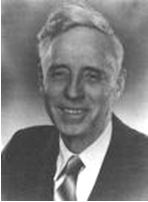
Brief scientific biography
Ralph L. Jeffery was born on October 3, 1889, in the small village of Overton, in Nova Scotia, Canada. In his childhood, nothing seemed more unlikely than an academic career in mathematics. In the middle of the eight grade, he left school and joined his father, Frank Jeffery, to become a fisherman. In 1910 however he decided that he did not want to remain a fisherman all his life. That was not because he was unhappy with his work but as he told much later, because he was not certain that he would still like it being 41 instead of 21. He attended Yarmouth Academy and then Nova Scotia Normal College, completing his studies there in 1915. He then became Principal of Port Maitland High School.
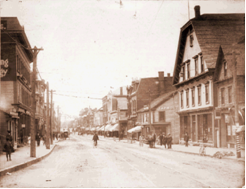
Yarmouth Highstreet around 1916
On 23 August 1916 he married Nellie Huntington Churchill from his native village Overton. She persuaded him to continue with his education and he enrolled in Acadia University in Wolfville, Nova Scotia. Although took a degree in economics, he also took two mathematics courses, one in calculus and one in analytic geometry, and this was decisive for his future life. He fell in love with mathematics and went to Cornell University to undertake graduate studies in math.
Two undergraduate courses may seem a rather poor foundation for graduating in math from Cornell, but he did. He continued his studies for a year at Harvard and in 1924 he was appointed head of Mathematics of Acadia University. In 1928 he stayed for one year in Cornell to obtain his doctorate. Besides his doctoral thesis, he published several research articles on analysis in those years.
Jeffery remained in Acadia until 1942, with the exception of 1938 when he stayed in Saskatchewan. In 1942, he moved to Queens University in Kingston, Ontario, where he became head of mathematics. After his retirement in 1960, he came back to Acadia, where he continued to teach until his death in 1975.
Educator and Organizer
Jeffery was a good mathematician who published several research articles. However, his most important contribution to the mathematical life in Canada is the promoting of both research and education, by means of his formidable organisational talents. He set out his ideas in his 1946 article The future of mathematics in Canada, in which he points out the difficulties the mathematical community in Canada had to face in those years: isolated universities with few opportunities for mathematical research, too heavy teaching loads for the academic staff and very limited prospects for young mathematicians. During his career, Jeffery tried to overcome these limitations.
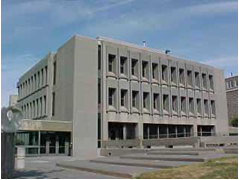
Jeffery Hall at Queens
At Queens University he built a strong mathematics department, with fine undergraduate and graduate teaching and research programs. Queens honoured his achievements by naming the new building that houses the math department after him. Jeffery was involved in the founding of the Canadian Mathematical Society and was its fourth president in 1957-1961. Perhaps his most important achievement was the establishment of the Summer Research Institute in 1950. Suitable accommodation was found in Queens and Jeffery raised the money for the support
The SRI became a success and an important factor in fostering mathematical research in Canada. Jeffery served the SRI as director for fifteen years. In the same period, 1952-1952, he was a member of the executive committee of the ICMI.
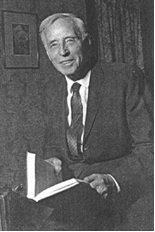
He persuaded them to set up a Mathematics Curriculum Committee, that played an important role in modernising the math curriculum. Of course Jeffery was a member of the committee, with a number of prominent teachers of the Province.
Another important initiative he was involved in was the Nova Scotia Summer School for Teachers, in coöperation with CMC Summer School. Jeffery received many honours. He was awarded honorary degrees by Acadia University, Dalhousie University, St Mary's University, Memorial University, McMaster University, Windsor University and Queen's University. He was a fellow of the Royal Canadian Society and served it as president of section III in 1953. The Canadian Mathematical Society honoured him by setting up the Jeffery-Williams Prize and several mathematical scholarships bear his name.
Literature
About Ralph L. Jeffery
Arnold J. Tingley 1995, Random Memories of Ralph Jeffery, in: CMS o SMC 1945-1995, Mathematics in Canada, Ottawa, 321-325.
G. de B Robinson 1976, Ralph I. Jeffery 1889-1975, Proceedings of the Royal Society of Canada (4), nr. 14, 68-70.
Mathematical Publications (selection)
R. L. Jeffery 1928 The uniform approximation of a sequence of integrals and the sequence of functions which define a definite integral containing a parameter Cornell (PH-D thesis).
R. L. Jeffery 1951 The theory of functions of a real variable. Toronto, reprinted by Dover Publications in 1985.
R. L. Jeffery 1954 Calculus, Toronto.
R. L. Jeffery 1956 Trigonometric series: a survey, Presindential Address to section III of the Royal Canadian Society in 1953, Toronto.
R. L. Jeffery 1971 A survey of operator algebras. Kingston (with I. Kaplansky, A.J. Coleman and A. Grothendieck).
Publications for teachers
R. L. Jeffery 1966 Algebra, grade 10: a preliminary teaching guide. Halifax, Dept. of Education
R. L. Jeffery 1969 Coordinate geometry and trigonometry. Halifax, Dept. of Education.
R. L. Jeffery 1970 Matrices, determinants and their applications to linear equations,: comments and solutions to problems. Halifax, Dept. of Education.
General
R. L. Jeffery 1946 The future of mathematics in Canada, first published in the Proceedings of the first Canadian Congress, Montreal, reprinted in CMS o SMC 1945-1995, Mathematics in Canada, Ottawa 1995.
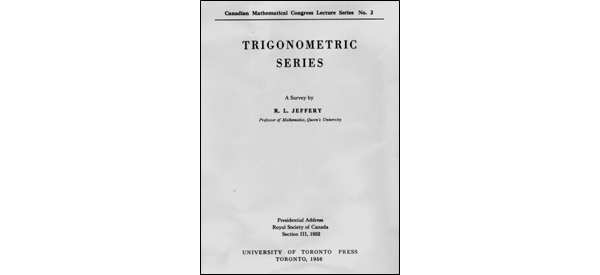
Author
Harm Jan Smid
Delft University of Technology
harm.smid@t-online.de
